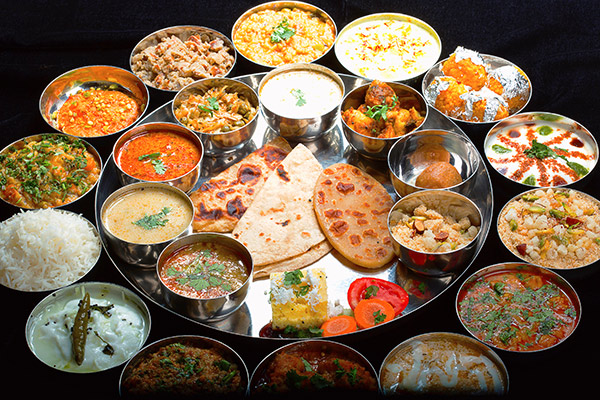ॐ श्री गुरुभ्यो नमः ॐ श्री शिवानन्दाय नमः ॐ श्री चिदानन्दाय नमः ॐ श्री दुर्गायै नमः
Source of all Images in this Blog-post : Google Images : ‘Google Image Search’ will reveal the multiple sources of every single image shared in this Blog. For more details, kindly see ‘Disclaimer‘

Marwadi Thali of Rajasthan: A Culinary Odyssey into Traditional Vegetarian Delights
Rajasthan, the land of kings and palaces, is not just known for its rich history and colorful culture but also for its distinctive and vibrant culinary traditions. Among these, the Marwadi Thali stands out as a quintessential representation of Rajasthan’s vegetarian cuisine. This traditional food platter is a harmonious blend of flavors, textures, and aromas, offering a unique gastronomic experience. Let’s embark on a flavorful journey to explore the Marwadi Thali of Rajasthan.
The Essence of Marwadi Cuisine
Marwadi cuisine, originating from the Marwar region of Rajasthan, is characterized by its simplicity and the ingenious use of limited resources. The arid climate and scarcity of water have significantly influenced the cooking methods and ingredients used. Predominantly vegetarian, Marwadi food is a brilliant example of how culinary constraints can lead to innovation in the kitchen.
The Components of a Marwadi Thali
A typical Marwadi Thali is a lavish spread, comprising various dishes served on a large steel or brass plate, with smaller bowls (katoris) used for the liquid items. The thali usually includes the following elements:
1. Breads (Rotis)
- Bajra Roti: A flatbread made from millet flour, known for its rich, earthy flavor.
- Missi Roti: Prepared with a mix of gram flour and wheat flour, spiced with ajwain (carom seeds) and turmeric.
2. Rice Dishes
- Gatta Pulao: Basmati rice cooked with spiced gram flour dumplings.
- Ker Sangri Rice: A traditional preparation combining ker (desert berries) and sangri (desert beans) with rice.
3. Vegetable Curries
- Gatte ki Sabzi: Gram flour dumplings cooked in a spicy yogurt-based gravy.
- Ker Sangri: A tangy and spicy mix of desert beans and berries, considered a delicacy.
- Panchmel Dal: A combination of five different lentils, tempered with spices.
4. Accompaniments
- Papad: Thin, crispy wafers made from lentil or rice flour.
- Chutneys: Ranging from sweet (like mango) to fiery (like green chili).
- Achaar (Pickle): Typically includes mango, lemon, or chili pickle.
5. Desserts
- Churma: A sweet dish made from coarsely ground wheat mixed with ghee and jaggery or sugar.
- Ghevar: A disc-shaped sweet cake made from flour and soaked in sugar syrup, Ghevar is a hallmark of Rajasthani sweet delicacies. This traditional dessert is particularly popular during the Teej and Raksha Bandhan festivals. Its intricate preparation and delightful taste make it a favorite among locals and visitors alike.
6. Yogurt and Buttermilk
- Raita: Whisked yogurt mixed with vegetables like cucumber or boondi (tiny fried gram flour balls), and seasoned with spices.
- Chaas: A refreshing buttermilk drink, often spiced with cumin and mint, ideal for cooling down in the hot desert climate.
The Art of Serving and Eating a Marwadi Thali
In a Marwadi Thali, the arrangement of the dishes is as important as their preparation. The breads are typically placed on the left side, with the rice dishes next to them. The vegetable curries and dal are served in small bowls, arranged in a semi-circle. The chutneys, pickles, and papad are placed on the right, with the dessert usually at the top center of the thali.
Eating a Marwadi Thali is an experience in itself. It is traditionally eaten with the hands, enhancing the sensory experience. Each dish is savored in sequence to appreciate its individual flavor, often starting with the less spicy dishes and moving towards the spicier ones. The meal usually ends with the sweet dish, leaving a lingering taste of sweetness.
The Significance of Marwadi Thali in Rajasthani Culture
The Marwadi Thali is not just a meal; it’s a celebration of the rich culinary heritage of Rajasthan. It reflects the spirit of hospitality and generosity that is deeply ingrained in Rajasthani culture. Serving a thali is considered an honor, and eating it is an acknowledgment of the love and effort put into its preparation.
Conclusion
The Marwadi Thali is a testament to the creativity and resilience of the people of Rajasthan. It showcases how food can be not just sustenance but a form of art, a part of cultural identity, and a means of bringing people together. Whether you are a food enthusiast or a curious traveler, indulging in a Marwadi Thali is a must to experience the true essence of Rajasthan’s culinary delights. So, the next time you find yourself in the land of deserts and palaces, make sure to treat yourself to this royal feast!
